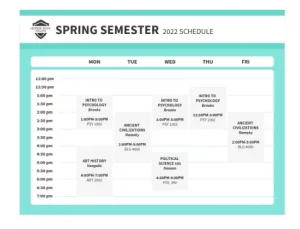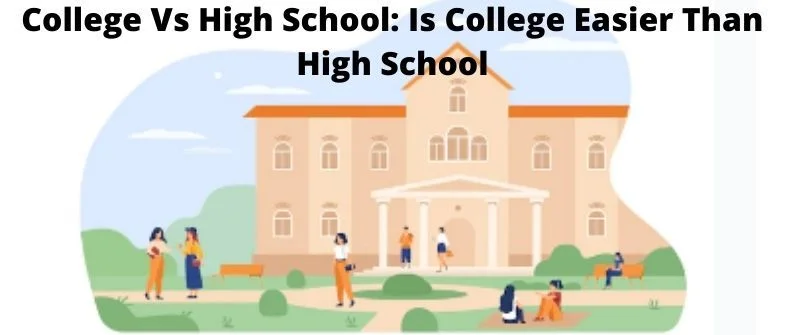Classes in college are harder when compared to those in high school. A cursory examination reveals there is more complication because college classes encompass in-depth analysis of concepts.
In the same way, learning in college involves a faster pace. Nonetheless, the college advantage is that you will have the chance to choose courses that you have an interest in.
Why are College Classes Harder than High School?

1. Class Time
There is a huge difference when it comes to class time. On average, students in high school spend about 6 hours per day in a class.
That translates to 30 hours in a single week.
In college, the duration is bigger and most classes are offered in the evening. This means students have to endure long hours in class. In colleges, students must learn how to manage their free time.
2. Size of Class
High schools have an average of 30-40 students which makes it easy for teachers to take charge. On the other hand, college classes can feature up to 200 students.
Professors take charge of this large number and this means you have to give maximum attention so that you do not miss important information.
A large number of students in a different environment can make it harder for new high school graduates.
3. Teaching Styles
High school usually involves the presentation of materials so that students can understand what is in their textbooks. It is all about writing information and students copy the notes.
However, college professors use illustrations to explain complicated concepts. A lot of information is involved for students to research the topic they are discussing.
As a student, you have to be in touch with all readings. In short, missing one class in college can make it difficult to catch up with the rest.
4. Management of Time
Administrators, teachers, parents, and coaches are in charge of structuring your time in college. On the other hand, you are in charge of your own time in college.
You have to take your own time to be in class or lab. Consequently, students who are not focused will miss classes and find it difficult to catch up with the rest. The college needs a lot of discipline and dedication.
Some people say, college life is fun. But, that is debatable.
5. Homework

Unlike high school where teachers constantly remind you of assignments and the due dates, the situation is completely different in college.
Your professor requires that you use the syllabus of the course which clearly explains what you are supposed to do.
It is up to the student to read and comprehend the syllabus material.
All the subsequent assignments will depend on how well you have done the previous ones.
Moreover, professors do not check all completed assignments but will work on assumptions that you can do the same when tests are given.
6. Testing
There is frequent testing in high school covering small materials of learning. This is where teachers will perform review sessions and identify important concepts for students.
Things are more complicated in college because testing is not frequent. It is possible to have just about 3 tests of a course in the entire semester.
Moreover, these tests cover a large number of materials. It is difficult to prepare for these tests because the organization of materials is too demanding. Yet on the face of it all, college professors rarely organize review sessions.
How to Pass College Classes
You can do better at college-level courses if you observe the following tips:
- Only select classes or subjects that you are interested in. With a lot of research and help from parents and professors, it will be easier to find courses that you can enjoy. Do not be forced to select courses you have no passion for.
- Always be on time for classes so that professors will not notice you are not consistently late. Once in class, make efforts to pay maximum attention. Absenteeism is a major cause for a professor dropping a student from class.
- Instructors are always there to offer help. Subsequently, ask frequent questions, especially in areas you do not understand. If you are shy, you can send them an email.
- Be a constant participant in the class. If there was a specific reading for the day, come prepared with applicable talking points and questions. Seek clarifications on materials that you do not comprehend. This is a good way of showing the professor you have an interest in the class.
- Read your syllabus meticulously. This is where you will get vital information such as course schedules and test preparations. You will also know when you are supposed to attend classes.
- Have all textbooks and ensure you read them. If you are unable to afford it, textbook scholarships and the library provide a better alternative for you. Books are vital course materials that you should crack regularly as you prepare for classes.

- Form study routine and timetable so that you can cover each course effectively. Most of the courses need independent work and only a study routine can make you cover all areas efficiently.
- Form study groups or find a study friend for each class. In case you miss a class, these groups are the best for consultation instead of bothering your professor who may be too busy.
The Main Difference Between College and High School
1. Teachers
High school has teachers who present materials to students for writing notes. In college, the instructors are referred to as professors or doctors if they have a doctorate. They offer lectures with illustrations of concepts.
2. Exams
High school exams are frequent and cover small concept materials. College involves infrequent exams that cover large amounts of material.
3. Grading
In high school, the grading of exams is based on the student’s ability to understand what was taught. It is a demonstration of how you can solve problems following the teacher’s illustrations.
In college, grades are based on your ability to apply the concepts you learned.
4. Time taken
One academic year in college consists of 2 separate semesters each having 14 weeks. There is also an extra exam week in each of the semesters. A school year in a typical high school takes 36 weeks long.
5. Class Schedule

On average, students spend 6 hours in class per day in high school. There are 36 learning weeks in the year.
Students have a short break during spring and a long summer break. In college, students spend 12-16 hours per week in class. There is winter and spring break.
6. Unit
In college, units or credits are the ones that determine the academic work needed for a student to graduate. In high school, the grades you get in each subject determine the outcome.
7. Specialization
In high school, students study the same amount of subjects and they have to accomplish the same number of classes in a subject.
It is completely different in college because you have to specialize in coursework that is specific to your study field or major.
8. Graduation Requirements
High school students can graduate having completed the required courses and have attained a grade of D and above.
In college, your average in classes has to meet the standard of the department. This is usually a C which translates to an average of 2.0.

Joseph is a freelance journalist and a part-time writer with a particular interest in the gig economy. He writes about schooling, college life, and changing trends in education. When not writing, Joseph is hiking or playing chess.
